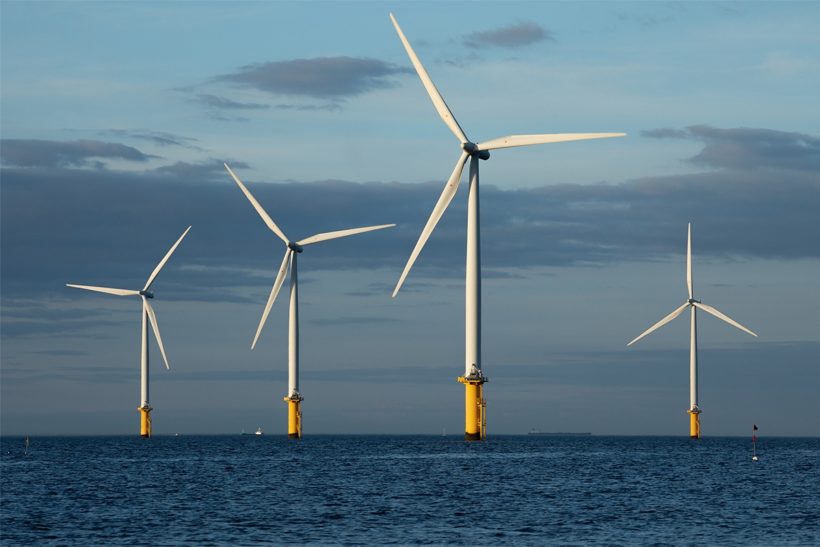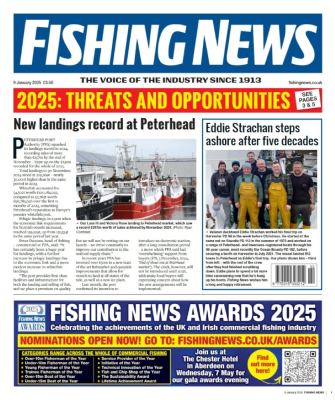The NFFO has launched a broadside against a government decision to create more MPAs to compensate for the damaging impact of wind turbines on the seabed in existing MPAs and Special Areas of Conservation.
NFFO chief executive Mike Cohen said the Defra statement demonstrated that the Labour government was ‘enthusiastically recycling a policy snatched from the wreckage of their Conservative predecessors’.
He said offshore wind farms had been promoted for years as ‘a clean energy panacea’, but this vision was now being questioned.
“People have become increasingly aware of their short lifespan, disruptive construction processes and vulnerability to attack. Now it seems there is acknowledgement that they are damaging the environment too,” he said.
Multiple wind farms had been permitted on the basis of Environmental Impact Assessment reports stating that they would cause no significant harm. “Now those same developments are apparently so damaging that a slew of new MPAs is necessary to make up for it. Knowing this, will we now pause in our headlong rush to industrialise Britain’s seas, until we understand how successive governments got it all so wrong?” asked Mike Cohen.
“Of course not. Nothing, it seems, will reduce the government’s enthusiasm for allowing foreign energy giants to build power stations in our waters.
Instead, we will allow them to carry on as before, damaging the marine environment in one location, while pretending that this can somehow all be made better by ‘protecting’ the sea somewhere else.”
He said the new announcement left a lot unsaid. “We do not know how large these MPAs will be, where they will be located or exactly how they will be managed.
“The fact that fishermen are mentioned so explicitly in the ministerial statement is a worrying sign of how obviously our industry is in the firing line, but also a positive indicator of the government’s willingness to engage with us.
“Indeed, it is quite refreshing to hear politicians acknowledging that the decisions they are taking will impact the fishing industry.”
He added: “Now it is admitted that these proposals have the potential to damage fishing businesses, perhaps we can start to have the honest conversations and do the difficult work necessary to minimise and mitigate the harm that most of us in the fishing industry have seen coming for years.”
The NFFO chief pointed out that the Fisheries Act and Joint Fisheries Statement commit to treating environmental, social, economic and food supply concerns equally. “We assume that the government will abide by the law and carefully balance these concerns in any decision that it makes about this new system of MPAs.
“We assume also that the commitment to base marine management measures on the best available science will also be upheld, and that these new MPAs will not be more examples of lines drawn on charts to satisfy the desire to control the sea and ban things, with no coherent conservation purpose served.”
He called for compensation to be paid to fishermen if their livelihoods were damaged by displacement by the offshore power industry. “If not, then the old ‘polluter pays’ principle of environmental management will be turned on its head – the energy companies will continue to pollute, while fishermen pay for it.”
There was, he argued, a solution to the problem of fishermen being ‘pushed aside’. This was to make more space for them by the UK reclaiming its six- to 12nm territorial limit, which ‘the Johnson government’s disastrous Brexit deal’ gave away.
“When the Trade and Co- operation Agreement that governs our relationship with Europe is revisited in 2026, our new government has the opportunity to finally do something different to its predecessor,” said Mike Cohen.
“It can stand up to the EU’s demands to continue the current unsustainable access arrangements, assert the UK’s autonomy as an independent coastal state and retake all of our territorial waters for UK fishermen. They will be far better able to withstand this latest increase in spatial squeeze as a result.
“Warm words about the importance of fishing and about food security are always welcome, but it is time they were followed by action. This is the perfect opportunity for Labour to show that they are made of sterner stuff than their predecessors and, at least in this regard, to start managing the UK’s seas for the benefit of its own people.”
Spatial impacts ‘a challenge for the fishing industry’
Announcing the new policy in a written ministerial statement, junior Defra minister Emma Hardy said multiple offshore wind projects are at risk because there are currently no options that developers can deliver themselves to compensate for their ‘unavoidable impacts on seabed habitats within Special Areas of Conservation and Marine Conservation Zones’.
Defra therefore plans to designate new MPAs and/or extend existing ones ‘to deliver sufficient strategic compensation to compensate for likely environmental effects of offshore wind development’.
In a specific reference to the impacts on fishing, she said Defra recognised that ‘accelerating development’ of marine activities, and environmental protection and restoration measures such as the designation of new MPAs, was increasing marine spatial tensions.
“These competing priorities and demands for space present a challenge for the fishing industry, particularly as it is unlikely that it will be possible to avoid causing an impact on fishing activities in all cases.”
She stressed the importance of fishing to the UK’s food supply and cultural identity – ‘so much so that we will not let these impacts on the industry go unaddressed’.
Defra leads a cross-government Marine Spatial Prioritisation programme, working with the MMO to address spatial squeeze and ensure the industry’s interests are represented.
“Government will ensure that the sector is supported to adapt to increased pressure on space. We will work with the industry to maintain its viability into the future and ensure it continues to make a significant contribution to coastal communities,” said Emma Hardy.
“The government is committed to finding ways for different industries to co-exist and benefit from our marine space. We will also work with the Crown Estate and other relevant stakeholders to see how they can help in this process. Food security is national security, and a sustainable fishing industry is an important part of that.”





